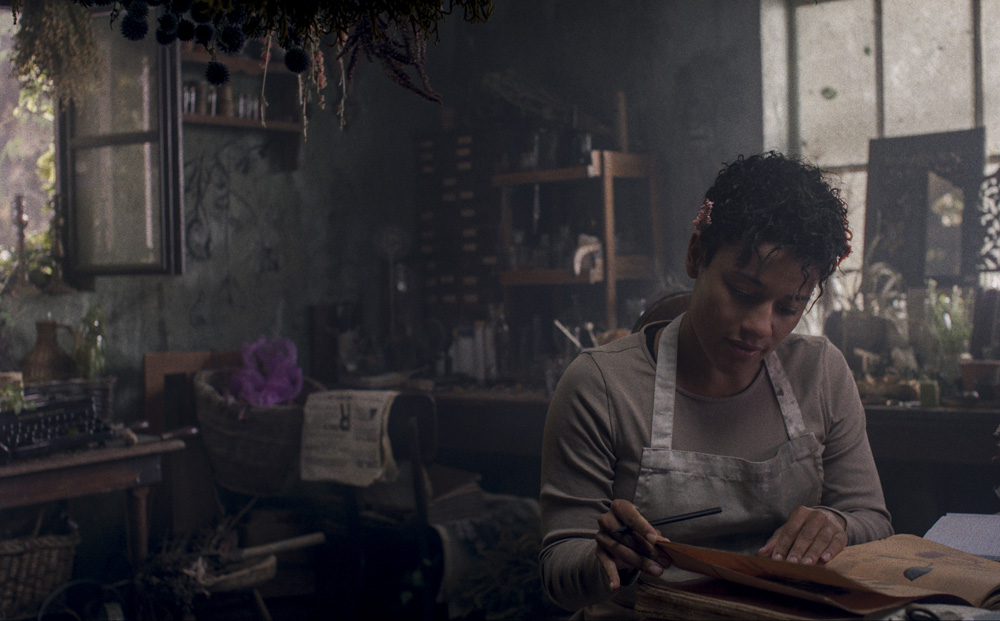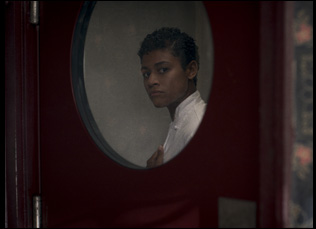What’s scary in “House of Spoils” is not what you’d think when Danielle Krudy and Bridget Savage Cole’s delicious character study begins at least a century before you meet the Chef (Ariana DeBose), set around a campfire where a group of women are grinding up herbs for a magic potion. The directors of “Blow the Man Down” could be making a movie about witches, or they could be making a haunted house film when the destination dining locale in upstate New York that lures the Chef away from a secure gig in the city sits on land that is thought to be cursed, yet as the chef pulls out bottles of prescription medication for her anxiety at taking such a pressure-filled position of running her own kitchen along with her Susanne Goin cookbooks, it’s clear the horror lies in more earthly fears of failure.
That “House of Spoils” is an unqualified triumph is all the sweeter when it becomes clear that Cole and Krudy are taking on the crushing weight of expectations they’ve experienced in the past, not only attempting to top their debut feature — in our humble opnion, one of the best of this young century — but also working in a creative industry where the demands of being an artist involve tedious work navigating bureaucracies and fussing over details that have little to do with the art itself and one that has been long overseen by men who think they know best. Surely they’ve pitched a fickle businessman like Chef’s benefactor Andres (Arian Moyed), who promises her full autonomy over a restaurant where she’ll be able to experiment to her heart’s delight, but beyond assigning her a sous chef (Barbie Ferreira) he’s likely schtuping, he is eager to pull the plug when results don’t happen immediately, trusting the opinion of a food blogger that comes for a try-out over the promise of the Chef that it’ll take time to find her groove.
After buying herself some time, Chef returns to her roots quite literally in finding the garden once occupied by a coven of witches as legend has it, unearthing ingredients no one has seen before and making unusually rich dishes. You don’t need to taste the food to know how satisfying it is when Cole and Rudy uses every element available to them to make something sumptuous for the eyes and ears, keeping up with their “West Side Story” star DeBose dancing about the kitchen to make sure the launch of the restaurant goes off without a hitch while showing the considerable toll it takes. Although “House of Spoils” is bound to be compared to a recent string of fine-dining themed entertainment where reservations aren’t only something that’s brought up with the maitre’d, showing the costs of cooking for a living with impossibly high standards, the film is singular when it clearly comes from the soul as Krudy and Cole dazzle with style but arrive at core truths about narratives when going back to the fundamentals serve Chef well and she comes to realize how many rotten legacies she’s carried on in her field when never thinking to question them, between how much she puts on her own shoulders and perpetuating endemic sexism.
Following its recent premiere at Fantastic Fest in Austin, “House of Spoils” is now available far and wide on Prime Video and the dynamic directing duo kindly spoke about dishing up something special with their second feature, the bait-and-switch of film food and the recipes they knew only they had to give it such depth.
Danielle Krudy: It was a real potpourri — a special chef’s mix of very personal ingredients and from the world around us. We really wanted to tell a story about a woman finding her voice and then we were drawn to the culinary world because we’d both been waitresses and worked in restaurants. We found a lot of inspiration in the arc of many women becoming chefs and a lot of relatable material in their journeys to our own.
I could definitely see a parallel to filmmaking when Chef is trying to concentrate on her art where she excels, but there’s all the other aspects to opening a restaurant that she has to adjust to, from learning to grow her own vegetables to delegating in the kitchen. Was that fun to incorporate?
Bridget Savage Cole: Definitely. This is a movie about work, and working hard [which is] something we really relate to. And it was a challenge [narratively] — can we make it about the work and the psychological journey that is finding your own voice and authentic way of making things [where] being a leader is in its own kind of hero’s journey. That’s what our goal was.
Danielle Krudy: Yeah, and you’re speaking to the art and the commerce clashing together in this way that you think you’re supposed to be good at one thing and then all of a sudden you have to be good at this whole other thing. Sometimes it’s sweeping the floor. You’ve got to wear so many different hats when to the external world, she’s supposed to be a chef and her job is to cook, but we know there’s much more that goes into it.
Bridget Savage Cole: I just was remembering in one of those Gabrielle Hamilton essays, she talks about scrubbing the floor with a toothbrush and just the high and the low of it. We just related so much as filmmakers. You’ve got to be willing to take out the trash too, and try to go for the vision, but also really respect all the different layers and everything that goes into it.
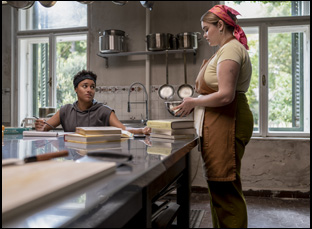
Bridget Savage Cole: We had great timing. We were trying to cast the movie with someone that could support it, that we could get the financing for and she had just won the Oscar for best supporting actress and was having a moment, but hadn’t really had a movie that she could totally own. We were able to connect with her and then she connected with the script…
Danielle Krudy: Yeah, Ariana would be the best to answer these questions, but I think, she could understand Chef’s ambition and devotion and passion…
Bridget Savage Cole: Yeah, and knowing that she was a dancer gave us a lot of confidence with knowing how much technique she was going to need to learn to be a chef and the coordination it was going to take [for] the choreography of this kitchen and the way you have to cook things a certain way, but also say your line. We felt like “man, this woman can do anything.”
What was it like to figure out this hub of activity in the kitchen?
Bridget Savage Cole: Working with food was one of the hardest parts of the film, absolutely hands down. Time itself added another layer where you needed to start [preparing food] before we said “Action.” That was a very humbling challenge, and then the time for resets [where it] took a lot of time to get all new ingredients in for the next take. Zoe Hedgedus, who we call a food creator, not a food stylist, was incredible. She just brought such a vision to this, telling the story through food.
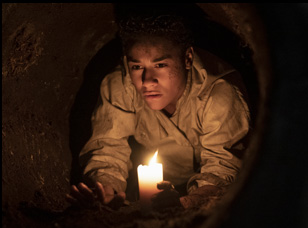
Danielle Krudy: Yeah, Zoe actually made like this little pepper thing that Ariana eats and that was a collaboration with the production designer. The pepper was made out of like a guava gel and created from scratch, at least from what I remember. Then other things were collaborations [with] the greens team, bringing things in and cross-checking with Zoe what’s edible. It was a lot of cross departments.
Bridget Savage Cole: We really wanted to find that line with some of the plant life where it was plausible, but also a little surreal, and where it felt familiar, but also maybe there’s a little room for mystery.
Since “Blow the Man Down,” I thought you had a handle on orienting an audience better than almost any filmmakers I could remember, but again, I felt like I could be plopped into this area and know exactly where I was going, which makes it all the more fun when you start introducing new parts of this place. Is geography something you think about a lot when writing a script?
Danielle Krudy: Bridget and I joke about this together all the time. Sometimes being a writer is having great themes, and sometimes being a writer is figuring out the geography of a haunted house where you think you backed yourself into a dead end and then you’ve got to come up with a solution, so holding the shared geography in our heads is a lot of the labor.
Bridget Savage Cole: Yeah, we definitely had diagrams of the [wine cellar] and we had so many conversations about [the scenes in the wine cellar] that used to happen in Andrea’s office, but then we were thinking is his office before the steps down [to the wine cellar] or is it after the steps down? All these dumb things, but you just have to think through a lot of geography with this guy.
Danielle Krudy: That’s another shared brain thing where [one of us says to the other], “Oh wait, you saw it like this,” and that can give us a new angle on it, which is fun.
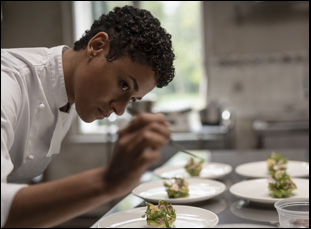
Bridget Savage Cole: We really need to credit Alexandra Schaller, our production designer. She is such a beast and had such a vision. This house, we didn’t even see it [when we got there]. We’re like, “I don’t know. Can this be the house?” It was bright yellow and you should really see the before and afters of the transformation of that house. But we love fun wallpapers and they were lots of them on our mood boards. And Alexandra had these custom designs made for the film that are so cool. I hope someday wallpaper a room in one of them. [laughs]
Was there a particularly crazy day of shooting on this?
Danielle Krudy: It’s always got its own energy when you’re filming on location, especially in a house that’s supposed to be haunted. Actually, [the production] took on its own really weird, cool little deranged camp [vibe]. There was a day when the AC broke and [we had a] fake fridge, which Alexandra Schaller created out of a closet, so it actually wasn’t cold, so basically all the food started really stinking and we were just working in a really smelly place.
Bridget Savage Cole: Yeah, it was really gross. [laughs] The ventilation needs of that day were really intense. Moldy onions are what I remember. We realized the moldy onions had been left in there and it was really hard to get it out.
Kind of seems like a perfect metaphor for the movie, given how beautiful it came out and you’re exposing the rot underneath this certain line of thought behind the fine dining industry.
Bridget Savage Cole: There were so many ironies with food on this movie. Our Budapest crew was incredible, but let’s say the catering was a bit strange and then you would see these beautiful dishes being served on camera. But then basically after take five, they’re all lukewarm and we’re just shooing flies away. The food really gets gross on set pretty fast.
Danielle Krudy: And it’s hard because food becomes fuel while you’re shooting and it’s hard, at least for me, to rekindle the pleasure aspect or connect with that while you’re just trying to keep going. So there was a big contrast in front of the camera and behind.
“House of Spoils” is now streaming on Prime Video.




